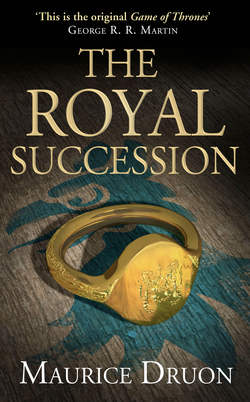Читать книгу The Royal Succession - Морис Дрюон - Страница 9
Prologue
ОглавлениеIN THREE HUNDRED AND twenty-seven years, from the election of Hugues Capet to the death of Philip the Fair, only eleven Kings had reigned in France and each one had left a son to ascend the throne.
It was a prodigious dynasty, which Providence seemed to have marked out for duration and permanence. Only two of the eleven reigns had covered less than fifteen years.
This singular continuity in the exercise and transmission of power had allowed, if not determined, the formation of national unity.
For the feudal link, a purely personal one between vassal and suzerain, between the weaker and the stronger, was substituted gradually another relationship, another compact uniting the members of a vast human community which had for long been subject to similar vicissitudes and an identical law.
If the concept of the nation had not yet become evident, its symbol already existed in the person of the sovereign, the supreme source of authority and the ultimate court of appeal. Whoever thought of the King also thought of France.
And Philip the Fair, throughout his life, had set himself to cement this nascent unity with a powerful centralized administration and the systematic destruction of external and internal rivalry.
Hardly had the Iron King died, when his son, Louis X, followed him to the grave. The population could not help but see in these two deaths, kings struck down in their prime, one following so quickly on the other, the finger of fate.
Louis X, the Hutin, had reigned eighteen months, six days and ten hours. During this short period of time, this pitiful monarch had destroyed the greater part of his father’s achievement. His reign had seen the murder of his Queen and the hanging of his first minister; famine had ravaged France; two provinces had rebelled; and an army had been engulfed in the Flanders mud. The great nobles were infringing on the royal prerogatives once more; reaction was all-powerful; and the Treasury empty.
Louis X had ascended the throne at a moment when the world lacked a Pope; he died before a Pontiff had been elected, and Christendom trembled on the verge of schism.
And now France was without a king.
For Louis X, by his marriage to Marguerite of Burgundy, had left only a daughter of five years of age, Jeanne of Navarre, who was suspected strongly of bastardy. By his second marriage, he had bequeathed but an expectation: Queen Clémence was pregnant; but would not be brought to bed for five months. Moreover, it was being canvassed openly that the Hutin had been poisoned.
No disposition had been made for a regency; and personal ambitions resulted in individual attempts to seize power. In Paris the Count of Valois endeavoured to have himself proclaimed Regent. At Dijon the Duke of Burgundy, brother of the murdered Marguerite and the powerful head of a baronial league, undertook to avenge the memory of his sister by championing the rights of his niece. At Lyons the Count of Poitiers, elder surviving brother of the Hutin, was grappling with the intrigues of the Cardinals and vainly striving to force the Conclave to a decision. The Flemings were but awaiting the occasion to take up arms again; while the nobility of Artois was pertinaciously conducting a civil war.
All this was enough to remind the people of the curse pronounced two years before by the Grand Master of the Templars from among the faggots of his pyre. In that age of superstition, it might well have seemed, in the first week of June 1316, that the Capets were an accursed race.
